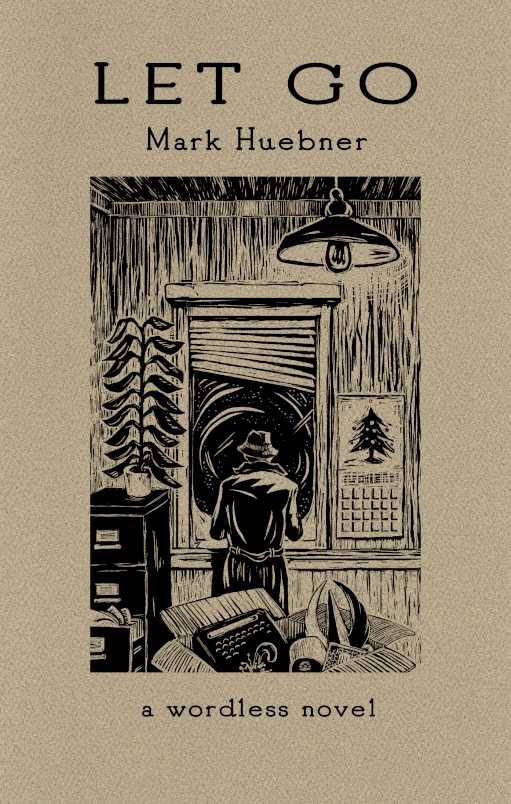Let Go
- 2021 INDIES Finalist
- Finalist, Graphic Novels & Comics (General)
An experiment in creating meaning, Let Go is a compelling wordless novel about accepting change.
A man is escorted from his former office on a snowy, windswept night in Mark Huebner’s wordless novel Let Go.
An unnamed man packs his personal possessions into a cardboard box under the watchful eye of a security guard. Each item connects to a significant moment from his time at the office, where he has fallen in love, won awards, and seen technology change to enhance his work. By all accounts, he has exceeded his company’s expectations. As he leaves and trudges through the city, his inner turmoil is reflected by the deserted streets. He works to decide how to move into his future.
The story varies in its approachability. With each item, it moves back in time so that the man can reflect on how he came to possess that particular object. When the story jolts back to the present, the object of concern falls out of the box and is lost—like an act of letting go. But unanswered questions linger, including about why the man was escorted off the premises of his workplace—and why he elected to keep these innocuous items, including an unwound tape, a typewriter, and a broken mug. His memories are a source of meaning, but the places at which he loses his possessions result in other meanings, too.
The illustrations in this wordless title are eye-catching and detailed. Each page contains a single linocut print, from which images emerge in black ink and negative space alone. Some of the prints are so rich that fabric textures and wood grain patterns are visible; others make extreme use of black, rendering their images near impossible to parse. But within even the most still of these images, there is movement, both subtle and extreme. Swooping and swirling lines denote the bluster of wind; snow drifts pile high against buildings. A flapping coat and hair standing on end simulate swift motions.
But because the art is the sole focal point of the book, the images sometimes overtake its sense of a story. The book’s foreword and afterword provide more narrative direction and closure, though they also somewhat undermine the experimental nature of the book by including information on advertising experiences that, in their industry-specificity, hamper the otherwise expansive tale.
A masterclass in visual storytelling, Let Go is a compelling wordless novel about accepting change.
Reviewed by
Dontaná McPherson-Joseph
Disclosure: This article is not an endorsement, but a review. The publisher of this book provided free copies of the book and paid a small fee to have their book reviewed by a professional reviewer. Foreword Reviews and Clarion Reviews make no guarantee that the publisher will receive a positive review. Foreword Magazine, Inc. is disclosing this in accordance with the Federal Trade Commission’s 16 CFR, Part 255.

